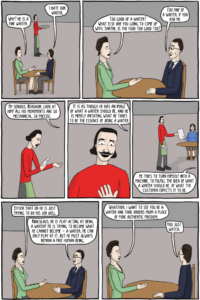There you are, sitting on the first day of your first class ever in college. It might be Gen. Chem I, Intermediate Writing, Survey of Jazz, Analysis of Argument, Philosophy and Human Nature or a dreaded math prerequisite you could swear you tested out of taking. You see a student, probably an 18-year-old freshman like yourself, looking for an empty seat to join you in beginning the life of a student of higher education.
Something about this student bothers you. They seem eager, a little too eager, to sit in that auditorium chair. Their movements are rapid, their motions are calculated and automatic. Their pencils are sharpened as if in preparation for mortal battle. Their tote bag of Sharpies, G-2 pens and highlighters are organized first by color, then by size. You watch them write notes and notice they do so with a stenographer’s precision. They raise their arm a little too quick to answer questions. The straps of this student’s backpack hang too symmetrically, too straight. Their pants are aggressively wrinkle-free, and the faultless color coordination of their outfit indicates it was selected days or weeks in advance.
You pinpoint what’s bothering you. This student, it seems, has embraced the role of student completely. They think of themselves first and primarily as a student, and only secondarily as a person or individual. They have foregone their idiosyncrasies and phenomenological uniqueness in exchange for the stability and security associated with the social role of student, trainee or apprentice. This person is acting out a role.
This is what the French philosopher, novelist and playwright Jean-Paul Sartre wrote about in his seminal and utterly inaccessible 1943 work “Being and Nothingness.” Only Sartre was not describing a university student, but a waiter in a French café.
“All his behavior seems to us a game,” Sartre wrote. “He applies himself to chaining his movements as if they were mechanisms, the one regulating the other; his gestures and even his voice seem to be mechanisms; he gives himself the quickness and pitiless rapidity of things. He is playing, he is amusing himself. But what is he playing? We need not watch long before we can explain it: he is playing at being a waiter in a cafe,” (original italics).

Sartre believes this waiter, who could be a musician, teacher, researcher, physician, merchant or student in any other scenario, is acting in bad faith. Bad faith is a form of self-deception in which we convince ourselves there is a correct, essential way of doing things, an essential way of living. Consequently, we limit ourselves from acting freely.
We need not live in bad faith, Sartre says, because human existence precedes essence. Unlike objects, like spoons, shovels or hammers which have defined characteristics, uses and purposes, there are no such definitional guidelines for being human. Unlike IKEA beds, being human does not come with assembly instructions and operating guidelines. Instead, bare, physical existence precedes set way of acting or being.
“… The waiter in the café can not be immediately a café waiter in the sense that this inkwell is an inkwell, or the glass is a glass. … He knows well what it [being a waiter] ‘means:’ the obligation of getting up at five o’clock, of sweeping the floor of the shop before the restaurant opens, of starting the coffee pot going, etc. … But all these concepts, all of these judgments refer to the transcendent. It is a matter of abstract possibilities, of rights and duties conferred on a ‘person possessing rights.’ And it is precisely this person who I have to be (if I am the waiter in question) and who I am not. It is not that I do not wish to be this person or that I want this person to be different. But rather there is no common measure between his being and mine. It is a ‘representation’ for others and for myself, which means that I can be he only in representation,” (original italics).
It is easy to deny our own freedom. It is easy to act as if there is some correct, transcendental way to be human or to blame your circumstance on a particular social institution or injustice. It is much harder, on the other hand, to embrace the “radical freedom” Sartre describes us all of possessing, and instead living a life through authentic, nonconforming existence.
Whatever your stage in life, you are probably still struggling to figure out exactly who you are. This is notoriously true of college students, which is normal and to be expected. It is okay to feel lost or directionless or even uncertain of the meaning of your existence. College should be the time to explore these uncertainties with enthusiasm and genuine curiosity, not to conform to arbitrary constructs of what a “good student” is or looks like. To reach your full subjective potential, to become your best self (whatever your definition of best may be), you should begin by embracing your individuality and acknowledging the wide reach of your autonomy. Welcome to your first year of college.



Jonah Brown • Aug 21, 2017 at 3:56 pm
Awesome read!
Brad • Aug 20, 2017 at 11:50 am
Reddit brought me here.
Bridget • Aug 20, 2017 at 11:49 am
Yes! Well written. These concepts seem applicable to almost any role or tile that we attach ourselves to.
Not only is it okay to feel lost and directionless, it is quintessentially human to feel this way.
Thank you for this!